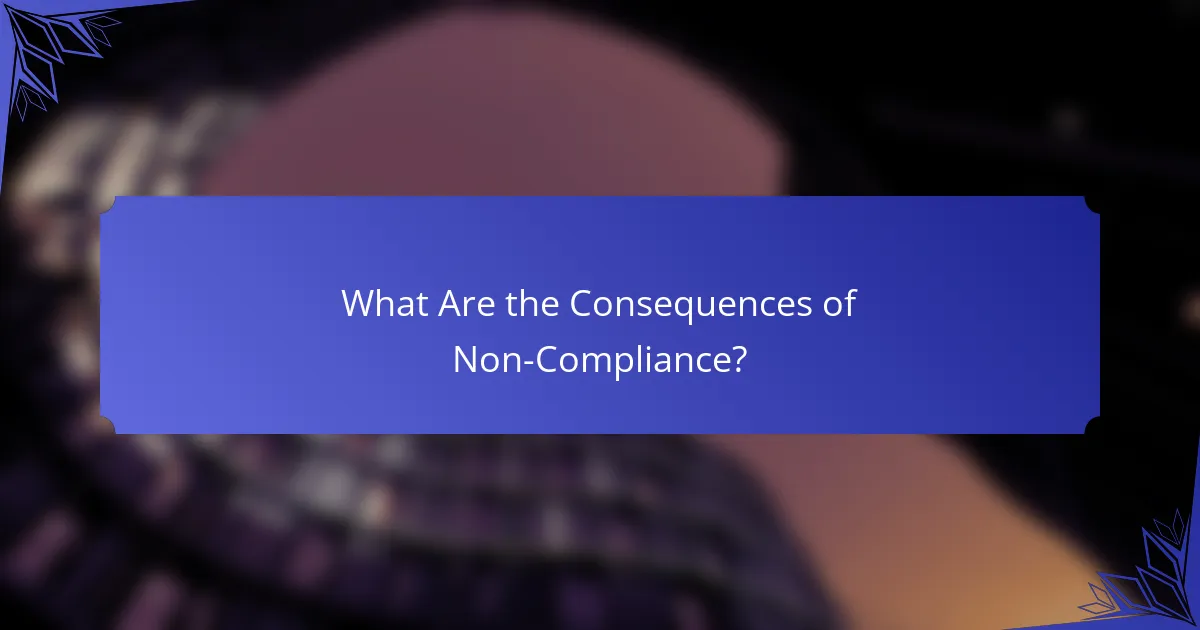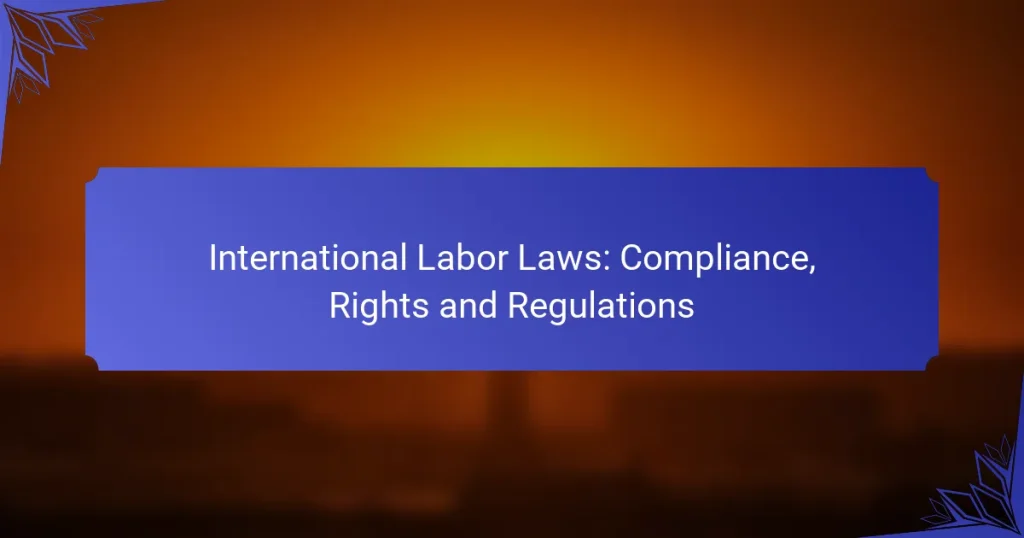International labor laws play a crucial role in establishing standards that safeguard workers’ rights and outline employer responsibilities across the globe. These regulations aim to prevent exploitation, ensure fair wages, and promote safe working conditions, fostering dignity and respect for all employees. Compliance with these laws requires a thorough understanding of regulations, regular audits, and effective training programs to uphold these essential rights in the workplace.

What Are the Key International Labor Laws?
Key international labor laws establish standards for workers’ rights and employer responsibilities across various jurisdictions. These laws aim to protect workers from exploitation, ensure fair wages, and promote safe working conditions globally.
International Labour Organization (ILO) Standards
The International Labour Organization (ILO) sets global labor standards that member states are encouraged to adopt. These standards cover a wide range of issues, including the right to organize, collective bargaining, and the prohibition of child labor and forced labor.
Countries that ratify ILO conventions are expected to implement these standards into their national laws. Compliance can vary, so businesses should regularly review local laws to ensure alignment with ILO principles.
European Union Labor Regulations
European Union (EU) labor regulations provide a framework for workers’ rights across member states. These regulations include directives on working time, health and safety, and anti-discrimination measures, ensuring a minimum level of protection for all workers in the EU.
Employers operating within the EU must comply with these regulations, which can differ significantly from one member state to another. Understanding local adaptations is crucial for compliance and to avoid penalties.
United States Fair Labor Standards Act
The Fair Labor Standards Act (FLSA) is a key piece of legislation in the United States that establishes minimum wage, overtime pay, and youth employment standards. It applies to most private and public sector employees, ensuring fair compensation for work performed.
Employers must keep accurate records of hours worked and wages paid to comply with the FLSA. Failure to adhere to these standards can result in legal action and financial penalties.
International Trade Agreements
International trade agreements often include labor provisions that set standards for workers’ rights and working conditions. These agreements aim to promote fair competition and prevent a race to the bottom in labor standards among countries.
Businesses engaged in international trade should be aware of the labor clauses in these agreements, as they can impact operational practices and compliance requirements. Regular audits and assessments can help ensure adherence to these standards.

How to Ensure Compliance with International Labor Laws?
Ensuring compliance with international labor laws involves understanding and adhering to various regulations that protect workers’ rights globally. Key steps include conducting regular audits, implementing training programs, and utilizing compliance software to track and manage obligations effectively.
Conduct Regular Audits
Regular audits are essential for assessing compliance with international labor laws. These audits should evaluate workplace practices, employee treatment, and adherence to legal standards. Aim to conduct these audits at least annually or biannually to identify potential issues early.
During audits, focus on key areas such as wage compliance, working hours, and health and safety regulations. Utilize a checklist to ensure all relevant aspects are reviewed, which can help streamline the process and provide a clear framework for evaluation.
Implement Training Programs
Training programs are crucial for educating employees and management about their rights and responsibilities under international labor laws. These programs should cover topics such as anti-discrimination policies, workplace safety, and proper reporting procedures for violations.
Consider offering training sessions at least once a year, supplemented by ongoing workshops or e-learning modules. This approach ensures that all staff remain informed about current regulations and best practices, fostering a culture of compliance within the organization.
Utilize Compliance Software
Compliance software can significantly enhance the management of labor law obligations. These tools help track regulations, manage documentation, and automate reporting processes, reducing the risk of human error. Look for software that offers features tailored to your specific industry and geographic location.
When selecting compliance software, consider factors such as user-friendliness, integration capabilities with existing systems, and customer support. Investing in the right technology can streamline compliance efforts and provide peace of mind regarding adherence to international labor laws.

What Are Employee Rights Under International Labor Laws?
Employee rights under international labor laws encompass various protections that ensure fair treatment, safety, and equality in the workplace. These rights are designed to promote dignity and respect for workers globally, regardless of their location or industry.
Right to Fair Wages
The right to fair wages guarantees that employees receive compensation that meets or exceeds the minimum wage standards set by their respective countries. This is crucial for ensuring that workers can support themselves and their families adequately.
Minimum wage laws vary significantly across countries. For example, in the European Union, minimum wages can range from around €1,500 to €2,000 per month, depending on the country. Employers should regularly review wage standards to ensure compliance and avoid penalties.
Right to Safe Working Conditions
Employees have the right to work in environments that are free from hazards and risks to their health and safety. This includes proper training, safety equipment, and adherence to safety regulations established by local authorities.
Employers must conduct regular safety assessments and provide necessary safety gear. For instance, construction workers should receive helmets and harnesses, while factory workers may need protective gloves and masks. Failure to maintain safe working conditions can lead to serious legal consequences.
Right to Non-Discrimination
The right to non-discrimination ensures that all employees are treated equally, regardless of race, gender, age, religion, or other personal characteristics. This principle is fundamental in promoting a diverse and inclusive workplace.
Employers should implement clear anti-discrimination policies and provide training to all staff. Regular audits can help identify and address any discriminatory practices. For example, ensuring equal pay for equal work is a critical aspect of this right, which can help mitigate potential legal disputes and foster a positive work environment.

How Do International Labor Laws Affect Businesses in Different Countries?
International labor laws significantly influence how businesses operate across various countries by establishing standards for worker rights, safety, and employment practices. Companies must navigate these regulations to ensure compliance and maintain ethical operations while managing costs and workforce dynamics.
Impact on Employment Practices
International labor laws dictate essential employment practices, including minimum wage, working hours, and employee rights. For example, many countries enforce a minimum wage that varies widely, impacting labor costs and hiring strategies. Businesses must adapt their human resources policies to align with local regulations to avoid legal repercussions.
Additionally, laws regarding employee benefits, such as paid leave and health insurance, can differ significantly. Companies operating in multiple jurisdictions should conduct regular audits of their employment practices to ensure compliance with local labor laws.
Influence on Global Supply Chains
International labor laws affect global supply chains by imposing standards that suppliers must meet, which can influence sourcing decisions. Companies may prioritize suppliers in countries with robust labor regulations to mitigate risks related to labor exploitation and ensure ethical sourcing. This can lead to increased costs but also enhances brand reputation.
Moreover, businesses must be aware of the potential for disruptions if suppliers fail to comply with local labor laws. Establishing strong relationships and conducting regular assessments of supply chain partners can help mitigate these risks.
Variations in Enforcement
The enforcement of international labor laws varies widely by country, affecting how businesses operate. In some nations, labor laws are strictly enforced, with severe penalties for non-compliance, while in others, enforcement may be lax, leading to a competitive advantage for non-compliant businesses. Understanding these variations is crucial for risk management.
Companies should stay informed about the enforcement landscape in the countries where they operate. Regular training for management and staff on local labor laws can help ensure compliance and reduce the risk of legal issues. Additionally, engaging with local labor organizations can provide valuable insights into enforcement trends and practices.

What Are the Consequences of Non-Compliance?
Non-compliance with international labor laws can lead to severe repercussions for businesses, including legal penalties, damage to reputation, and significant financial losses. Understanding these consequences is crucial for maintaining compliance and protecting organizational integrity.
Legal Penalties
Legal penalties for non-compliance can vary widely depending on the jurisdiction and the specific laws violated. Companies may face fines that can range from thousands to millions of dollars, depending on the severity of the infraction. In some cases, repeated violations can lead to criminal charges against responsible individuals.
Organizations may also be subject to sanctions, such as restrictions on business operations or loss of licenses. It is essential to stay informed about local labor laws to avoid these legal pitfalls.
Reputation Damage
Reputation damage is a significant consequence of failing to comply with labor laws. Companies that are found in violation may face public backlash, leading to a loss of customer trust and loyalty. Negative media coverage can further exacerbate this damage, impacting brand image.
In today’s digital age, information spreads quickly, and a single compliance failure can tarnish a company’s reputation for years. Businesses should prioritize transparency and ethical practices to mitigate this risk.
Financial Losses
Financial losses resulting from non-compliance can be substantial. Beyond legal fines, companies may incur costs related to litigation, settlements, and increased insurance premiums. Additionally, the loss of business due to damaged reputation can lead to decreased revenue.
Organizations may also face operational disruptions as they scramble to rectify compliance issues, which can further strain financial resources. Implementing robust compliance programs can help prevent these costly outcomes.

How to Select a Compliance Consultant for Labor Laws?
Selecting a compliance consultant for labor laws involves assessing their qualifications and understanding your specific regulatory needs. A good consultant should have a strong grasp of local labor regulations and the ability to tailor their services to your organization.
Evaluate Experience and Expertise
When evaluating a compliance consultant, consider their experience in labor law and their familiarity with your industry. Look for consultants who have worked with businesses similar to yours, as they will better understand the specific challenges you face.
Check their track record by asking for case studies or references from previous clients. A consultant with a proven history of successful compliance projects can provide valuable insights and strategies to help you navigate labor regulations effectively.
Additionally, verify their qualifications and certifications. Consultants with recognized credentials, such as a Certified Compliance and Ethics Professional (CCEP) or similar designations, demonstrate a commitment to maintaining high standards in compliance practices.


